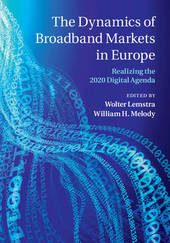
|
The Dynamics of Broadband Markets in Europe: Realizing the 2020 Digital Agenda
Hardback
Main Details
| Title |
The Dynamics of Broadband Markets in Europe: Realizing the 2020 Digital Agenda
|
| Authors and Contributors |
Edited by Wolter Lemstra
|
|
Edited by William H. Melody
|
| Physical Properties |
| Format:Hardback | | Pages:448 | | Dimensions(mm): Height 254,Width 178 |
|
| ISBN/Barcode |
9781107073586
|
| Classifications | Dewey:384.041094 |
|---|
| Audience | | Professional & Vocational | |
|---|
| Illustrations |
47 Tables, black and white; 65 Line drawings, unspecified
|
|
Publishing Details |
| Publisher |
Cambridge University Press
|
| Imprint |
Cambridge University Press
|
| Publication Date |
23 October 2014 |
| Publication Country |
United Kingdom
|
Description
The European Commission's Digital Agenda for Europe sets the targets for broadband development by 2020, yet current broadband market outcomes vary widely amongst the EU Member States and the objectives seem challenging for many. In this book, a group of in-country experts follows a framework of qualitative and quantitative analysis to capture patterns, commonalities and differences between twelve different European countries, in terms of infrastructure endowments, institutional arrangements, time of joining the EU, behavior of market actors, personal interventions of regulators, the role of municipalities, and the role perception of governments. By exploring how the past explains present broadband market outcomes, these longitudinal country case studies look to how improvements can be made for the future. As the first in-depth study of broadband developments in Europe, this book will be invaluable to policy-makers, regulators, academic researchers, advisors, and consultants working in the fields of telecommunications, broadband development, technology and innovation.
Author Biography
Wolter Lemstra is Senior Research Fellow in the Department of Technology, Policy and Management at Delft University of Technology, The Netherlands, and Visiting Senior Research Fellow at the Centre for Communication, Media and Information Technologies at Aalborg University, Denmark. He has 25 years of experience in the telecom sector and has occupied senior management positions in various telecoms technology firms. His current research is focussed on telecommunication sector governance, industry structure developments, firm strategic behaviour and innovation trajectories. William H. Melody is Guest Professor at the Center for Communication, Media and Information Technology (CMI), Aalborg University Copenhagen, Denmark. He is Emeritus Professor, Economics of Infrastructures at the Department of Technology, Policy and Management, Delft University of Technology, and Emeritus Director, Learning Initiatives on Reforms for Network Economies (LIRNE.NET). He has participated in telecom and ICT research and policy development in all regions of the world.
Reviews'After two decades of regulatory convergence the major global regions have pursued more differentiated paths during the past decade. In contrast to the US which adopted a framework steeped in minimally regulated markets and the government-centric approaches of many Asian nations, the EU has pursued a hybrid model combining competition, regulation and forms of industrial policy intervention. The national diversity that exists within the common European framework constitutes a natural experiment from which important lessons can be learned. The case studies assembled and expertly analyzed in this volume provide unique insights into the diversity of policy models across the EU, the effects of these choices for sector performance, and options for pursuing the ambitious goals of the Digital Agenda for Europe.' Johannes M. Bauer, Michigan State University and Chair, Telecommunications Policy Research Conference, 2010-13 'The authors are to be congratulated on producing such a rigorous and subtle analysis of the commonalities and the differences between Europe's national broadband markets - competitive markets are good but bringing broadband to everyone will require pragmatic public and private approaches. The analysis here provides policy makers with the solid foundation needed for wise future policy to stimulate broadband investment and take-up.' Colin Blackman, Editor, info and Director, Digital Forum, Centre for European Policy Studies 'One of the most important messages from the research in this book is that for the next stage of broadband infrastructure and digital economy development, there is no single policy pathway to success. Each country's unique legacy may be the most important factor in determining the set of policies and practices necessary to meet the EU Digital Agenda objectives. A common model of policy reform, such as the liberalization model that has been widely applied with significant success in the past, is no longer sufficient. The most important determinants of success will be government policies and industry investment programs that build on each country's historical and cultural development, and its current economic and governmental structure.' Jorgen Abild Andersen, Chairman, OECD Committee on Digital Economy Policy and former Director General, National IT and Telecom Agency, Denmark, 1991-2011 'It is refreshing to see an analysis that focuses on the 'market dynamics' of broadband growth in Europe, and how it affects policy implementation in different countries. The well-documented conclusion that achieving the EU 2020 broadband targets requires country-specific policy implementation strategies is an important message for both market players and policymakers. The next step is the recognition that this can best be done with a single European telecom regulator.' Ben Verwaayen, former CEO of KPN, BT and Alcatel-Lucent
|